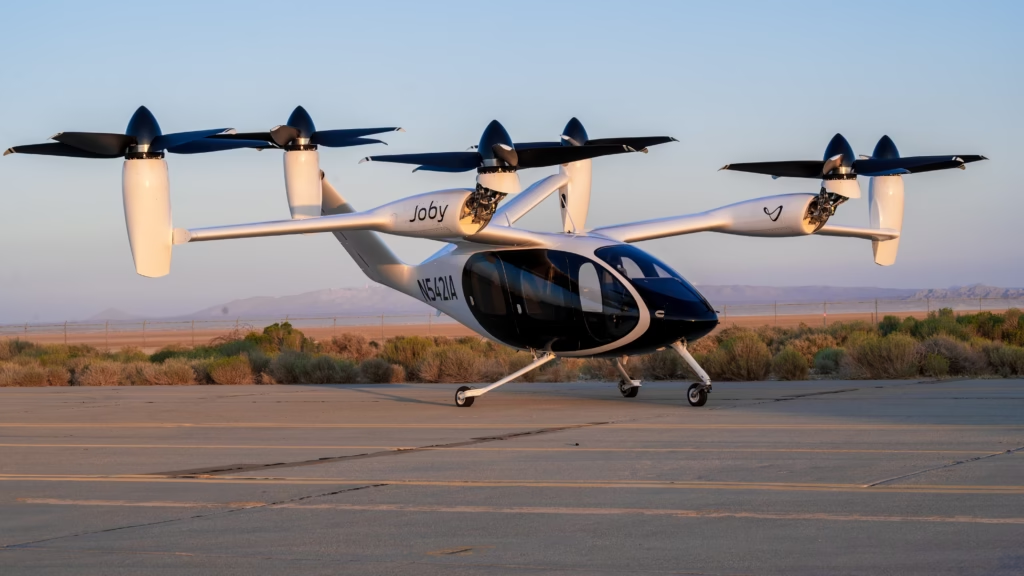Joby expands aircraft manufacturing and it’s not just a business move, it’s a sign of a new era in aviation. Just weeks after completing its first test flight in Dubai, Joby Aviation announced a major expansion of its aircraft production capacity in the United States. This exciting development has caught the attention of investors, tech enthusiasts, and the entire aviation industry.
The company, known for its cutting-edge electric vertical take-off and landing (eVTOL) aircraft, is positioning itself as a leader in the race to make urban air mobility a reality. Let’s take a closer look at why this expansion is significant, what it means for the future of air travel, and how Joby is shaping the way we think about transportation.
The Dubai test flight: a global milestone
Joby’s test flight in Dubai was more than a simple demonstration. It was a bold statement to the world. Dubai has been investing heavily in advanced transport solutions, aiming to become a global leader in futuristic mobility.

The flight showcased Joby’s electric aircraft capabilities, proving that its design and technology can perform reliably in a challenging environment. With hot temperatures and strict regulatory oversight, Dubai was the perfect testing ground.
The event attracted global media coverage and created buzz in the aerospace community. It highlighted Joby’s commitment to bringing safe, quiet, and zero-emission air travel to urban centers worldwide.

Why expand aircraft manufacturing now?
After the success in Dubai, Joby expands aircraft manufacturing in the US to meet growing demand and prepare for commercial launches. The company plans to start passenger services as early as 2025 in some markets.
By expanding its facilities in Dayton, Ohio, and other US locations, Joby is taking proactive steps to ensure it can produce aircraft at scale. The new manufacturing site will not only increase production capacity but also create hundreds of new jobs, boosting local economies.
This decision reflects confidence in the eVTOL market and Joby’s readiness to lead.
The Dayton, Ohio facility: a strategic choice
Choosing Dayton was no accident. Dayton is known as the birthplace of aviation since the Wright brothers built their first planes there. This historical connection adds symbolic value to Joby’s move.
The state of Ohio also offers strong support for advanced manufacturing, including financial incentives and a skilled workforce. These factors make it an ideal location for expanding production.
With this new facility, Joby aims to produce up to 500 aircraft per year once fully operational. The company expects the first phase to be completed within the next few years, with aircraft rolling out by 2026.
Joby’s aircraft: changing how we travel
When we think of air travel, most people imagine crowded airports, long security lines, and noisy jet engines. Joby’s vision challenges that entirely.
The company’s eVTOL aircraft is designed to carry four passengers plus a pilot, with a range of up to 100 miles on a single charge. It can reach speeds of up to 200 mph and is nearly silent during flight.
This makes it ideal for short city-to-city or even intra-city trips, reducing travel time and congestion. Imagine traveling from downtown Manhattan to JFK Airport in just 7 minutes instead of 45 minutes by car.
By expanding aircraft manufacturing, Joby is getting closer to making this vision part of everyday life.
Environmental benefits: greener skies ahead
One of the most important aspects of Joby’s aircraft is its commitment to sustainability. The eVTOL is fully electric, which means it produces zero emissions during flight.
As cities around the world grapple with air pollution and climate change, electric aircraft provide a promising solution. Urban air mobility could reduce ground traffic, lower greenhouse gas emissions, and improve air quality in major metropolitan areas.
Joby’s move to scale up manufacturing in the US ensures that it can meet environmental goals while delivering cutting-edge transportation options.

Economic impact: jobs and innovation
Joby’s expansion is expected to generate significant economic benefits. The new manufacturing sites will create hundreds of high-tech jobs in engineering, assembly, maintenance, and administration.
Beyond direct employment, Joby’s growth will stimulate the local supply chain. Companies providing components, batteries, software, and support services will also benefit.
This kind of economic ripple effect has been seen before with other major aviation hubs, and Joby hopes to replicate that success.
Furthermore, this expansion strengthens the US position in the global advanced air mobility market, which is projected to be worth over $1 trillion by 2040.
Global ambitions: Dubai as a launchpad
Joby’s Dubai test flight signals the company’s global ambitions. Dubai is one of the first cities in the world to actively plan for air taxi services.
By demonstrating its aircraft in Dubai, Joby has positioned itself as a strong partner for future urban air mobility projects in the Middle East and beyond.
The Gulf region is investing heavily in smart cities and sustainable transport solutions. As a result, Joby’s early engagement could open doors to lucrative contracts and collaborations.
Competitive landscape: who else is in the race?
Joby is not the only player in the eVTOL space. Companies like Archer Aviation, Lilium, Vertical Aerospace, and EHang are also developing electric aircraft with similar goals.
However, Joby has a few advantages.
Strong backing from investors like Toyota and Intel gives Joby financial stability.
Early FAA certification progress puts Joby ahead of many competitors.
Proven flight tests with thousands of miles flown under real-world conditions give Joby an edge.
By expanding aircraft manufacturing in the US, Joby is working to stay ahead of the pack and secure first-mover advantage.
Challenges ahead: certification and public acceptance
Despite its progress, Joby still faces challenges. Certification from aviation authorities like the FAA and EASA is complex and time-consuming.
Public perception is another hurdle. While the idea of flying taxis is exciting, people may have concerns about safety, noise, and privacy.
Joby is addressing these issues through rigorous testing, transparent communication, and partnerships with local governments. The recent Dubai test flight helped build credibility and demonstrate safety to a global audience.
A new era for American aviation
The announcement that Joby expands aircraft manufacturing in the US is more than an industrial move. It represents a new era in American aviation.
Since the Wright brothers’ first powered flight in 1903, the US has been a global leader in aerospace innovation. Joby’s work continues this tradition, combining modern technology with a focus on sustainability.
As electric aircraft become more common, the US is poised to remain at the forefront of this revolution, creating jobs, attracting investment, and setting global standards.
Urban air mobility: not a dream anymore
A few years ago, flying cars seemed like science fiction. Today, they are on the verge of becoming reality.
Joby’s expansion proves that urban air mobility is not just a distant dream. It is a real, concrete project backed by engineering, funding, and public interest.
By 2030, many experts believe air taxis will become a common sight in cities around the world. Joby’s proactive steps from successful test flights to expanding aircraft manufacturing suggest it will play a major role in shaping this future.

What it means for travelers
For everyday travelers, Joby’s aircraft promise faster, cleaner, and more convenient travel options. Instead of sitting in traffic for an hour, you might be able to fly to your meeting in minutes.
Noise reduction and zero emissions also mean less disruption to neighborhoods and the environment.
As prices drop with increased production, air taxi services could become as affordable as a premium car ride today. The possibility of democratizing air travel is closer than ever.
Conclusion: A bold leap forward
Joby expands aircraft manufacturing in the US, and this move marks a major leap forward for the future of transportation.
By combining successful global demonstrations like the Dubai test flight with strategic domestic growth, Joby is positioning itself as a pioneer in electric air mobility.
With strong technological foundations, clear market demand, and a commitment to sustainability, Joby’s journey is one worth watching.
As we look to the skies, it’s clear that the future of mobility is not just about roads. It’s about redefining how we move above them.
Do follow UAE Stories on Instagram
Read More: UK recalls Dubai chocolate bars over peanut allergen risk












